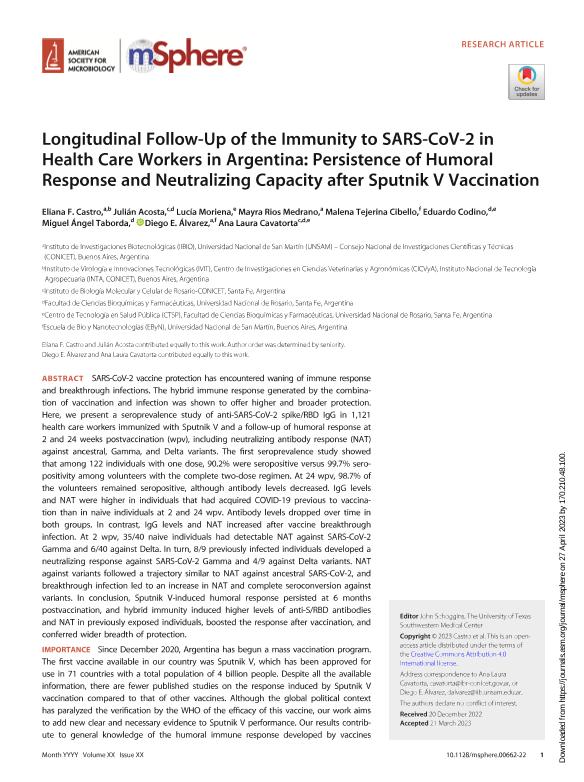Artículo
Longitudinal Follow-Up of the Immunity to SARS-CoV-2 in Health Care Workers in Argentina: Persistence of Humoral Response and Neutralizing Capacity after Sputnik V Vaccination
Castro, Eliana Florencia ; Acosta, Julian
; Acosta, Julian ; Moriena, Lucía; Ríos Medrano, Mayra Agustina
; Moriena, Lucía; Ríos Medrano, Mayra Agustina ; Tejerina Cibello, Malena
; Tejerina Cibello, Malena ; Codino, Eduardo Cesar; Taborda, Miguel Angel; Alvarez, Diego Ezequiel
; Codino, Eduardo Cesar; Taborda, Miguel Angel; Alvarez, Diego Ezequiel ; Cavatorta, Ana Laura
; Cavatorta, Ana Laura
 ; Acosta, Julian
; Acosta, Julian ; Moriena, Lucía; Ríos Medrano, Mayra Agustina
; Moriena, Lucía; Ríos Medrano, Mayra Agustina ; Tejerina Cibello, Malena
; Tejerina Cibello, Malena ; Codino, Eduardo Cesar; Taborda, Miguel Angel; Alvarez, Diego Ezequiel
; Codino, Eduardo Cesar; Taborda, Miguel Angel; Alvarez, Diego Ezequiel ; Cavatorta, Ana Laura
; Cavatorta, Ana Laura
Fecha de publicación:
04/2023
Editorial:
American Society for Microbiology
Revista:
mSphere
ISSN:
2379-5042
Idioma:
Inglés
Tipo de recurso:
Artículo publicado
Clasificación temática:
Resumen
SARS-CoV-2 vaccine protection has encountered waning of immune response and breakthrough infections. The hybrid immune response generated by the combination of vaccination and infection was shown to offer higher and broader protection. Here, we present a seroprevalence study of anti-SARS-CoV-2 spike/RBD IgG in 1,121 health care workers immunized with Sputnik V and a follow-up of humoral response at 2 and 24 weeks postvaccination (wpv), including neutralizing antibody response (NAT) against ancestral, Gamma, and Delta variants. The first seroprevalence study showed that among 122 individuals with one dose, 90.2% were seropositive versus 99.7% seropositivity among volunteers with the complete two-dose regimen. At 24 wpv, 98.7% of the volunteers remained seropositive, although antibody levels decreased. IgG levels and NAT were higher in individuals that had acquired COVID-19 previous to vaccination than in naive individuals at 2 and 24 wpv. Antibody levels dropped over time in both groups. In contrast, IgG levels and NAT increased after vaccine breakthrough infection. At 2 wpv, 35/40 naive individuals had detectable NAT against SARS-CoV-2 Gamma and 6/40 against Delta. In turn, 8/9 previously infected individuals developed a neutralizing response against SARS-CoV-2 Gamma and 4/9 against Delta variants. NAT against variants followed a trajectory similar to NAT against ancestral SARS-CoV-2, and breakthrough infection led to an increase in NAT and complete seroconversion against variants. In conclusion, Sputnik V-induced humoral response persisted at 6 months postvaccination, and hybrid immunity induced higher levels of anti-S/RBD antibodies and NAT in previously exposed individuals, boosted the response after vaccination, and conferred wider breadth of protection. IMPORTANCE Since December 2020, Argentina has begun a mass vaccination program. The first vaccine available in our country was Sputnik V, which has been approved for use in 71 countries with a total population of 4 billion people. Despite all the available information, there are fewer published studies on the response induced by Sputnik V vaccination compared to that of other vaccines. Although the global political context has paralyzed the verification by the WHO of the efficacy of this vaccine, our work aims to add new clear and necessary evidence to Sputnik V performance. Our results contribute to general knowledge of the humoral immune response developed by vaccines based on viral vector technology, highlighting the higher immune protection conferred by hybrid immunity and reinforcing the importance of completing vaccination schedules and booster doses to maintain adequate antibody levels.
Palabras clave:
SARS-COV-2
,
SPUTNIK V
,
HUMORAL IMMUNE RESPONSE
,
HYBRID IMMUNITY
,
COVID-19
Archivos asociados
Licencia
Identificadores
Colecciones
Articulos (IIBIO)
Articulos de INSTITUTO DE INVESTIGACIONES BIOTECNOLOGICAS
Articulos de INSTITUTO DE INVESTIGACIONES BIOTECNOLOGICAS
Articulos (IVIT)
Articulos de INSTITUTO DE VIROLOGIA E INNOVACIONES TECNOLOGICAS
Articulos de INSTITUTO DE VIROLOGIA E INNOVACIONES TECNOLOGICAS
Articulos(IBR)
Articulos de INST.DE BIOLOGIA MOLECULAR Y CELULAR DE ROSARIO
Articulos de INST.DE BIOLOGIA MOLECULAR Y CELULAR DE ROSARIO
Citación
Castro, Eliana Florencia; Acosta, Julian; Moriena, Lucía; Ríos Medrano, Mayra Agustina; Tejerina Cibello, Malena; et al.; Longitudinal Follow-Up of the Immunity to SARS-CoV-2 in Health Care Workers in Argentina: Persistence of Humoral Response and Neutralizing Capacity after Sputnik V Vaccination; American Society for Microbiology; mSphere; 8; 3; 4-2023; 1-14
Compartir
Altmétricas



